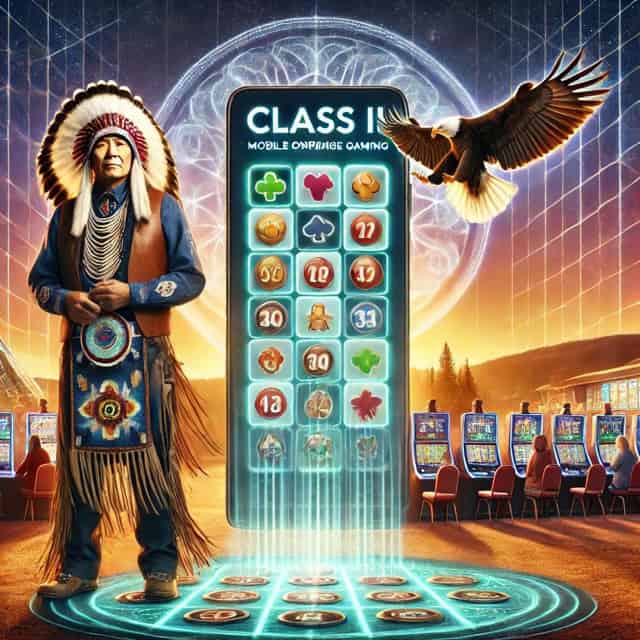
For centuries, Native American tribes have fought to preserve their sovereignty, a deeply rooted principle tied to their history, culture, and traditions. This battle for self-determination now extends into the gaming industry, where tribes are not just participants but pioneers, leveraging their sovereignty to embrace innovative gaming technologies, such as Class II mobile on-premise gaming.
As tribal gaming continues to grow in importance for Native economies, Class II gaming has emerged as a crucial tool for tribes to exercise their rights without the limitations imposed by state and federal regulations associated with Class III gaming. Class II games, which include bingo and non-banked card games like poker, do not require the extensive state compacts that Class III slot machines or table games do. This opens up an exciting avenue for tribes to maintain control over their gaming operations while offering innovative gaming solutions to their communities.
The Role of Class II Gaming in Tribal Sovereignty
Class II gaming has long been a symbol of tribal sovereignty, providing tribes with the autonomy to govern gaming operations on their land without relying on state oversight. The Indian Gaming Regulatory Act (IGRA) of 1988 classified games into three categories, with Class II gaming offering tribes a unique blend of independence and opportunity.
This category has historically been dominated by bingo and card games, but recent technological advances have expanded its reach into new, exciting territories—one of which is mobile on-premise gaming.
The Rise of Class II Mobile On-Premise Gaming
Class II mobile gaming solutions have revolutionized how tribes operate their casinos and gaming centers, offering a mobile-first approach that enhances the player experience while adhering to the regulatory framework of Class II gaming. This mobile gaming platform allows players to access their favorite Class II games via a mobile device, whether they are inside the casino premises or within the designated gaming area on tribal land.
Unlike typical mobile apps available in commercial casinos, Class II mobile on-premise gaming platforms are designed to operate exclusively within a tribe’s sovereign jurisdiction. Players can enjoy a variety of Class II bingo-style games or card games through their smartphones or tablets, bringing a modern, tech-forward solution to the traditional casino experience. The beauty of this solution is that it maintains the tribe’s regulatory autonomy while pushing the boundaries of innovation.
Flexibility and Control
The flexibility provided by Class II mobile gaming is a testament to tribal sovereignty. Tribal gaming commissions, instead of state governments, are responsible for the oversight of these operations. Tribes retain control over their regulatory processes, game design, and player protections, offering a truly sovereign experience in line with their economic and cultural goals.
This flexibility extends to how games are offered and managed. Mobile platforms allow tribes to quickly adapt to changing player demands, adding new games, promotions, and incentives without needing to negotiate new compacts or approvals from state agencies. This autonomy over their gaming environment strengthens their ability to make decisions that benefit their communities while minimizing outside interference.
A Revenue Stream for Future Generations
Tribal gaming has long been a critical source of revenue for Native American nations, funding essential services such as education, healthcare, housing, and infrastructure development. By embracing Class II mobile gaming, tribes are ensuring the sustainability of their gaming operations and securing a future-proof revenue stream.
With the increasing use of mobile technology across the gaming industry, on-premise mobile platforms provide an immediate opportunity for growth. Tribes can reach younger, tech-savvy audiences who prefer mobile gaming while still maintaining the social, community-driven aspects of on-premise gaming.
As the mobile gaming market grows globally, tribal nations are well-positioned to capitalize on this trend by leveraging their Class II gaming rights to expand their offerings. This growth doesn’t only benefit the tribes economically but also reinforces their sovereignty by providing a platform that is entirely within their control.
Challenges and Opportunities Ahead
While Class II mobile on-premise gaming offers numerous benefits, it also comes with challenges. Implementing a robust mobile gaming infrastructure requires significant investment in technology, staff training, and cybersecurity. Additionally, tribes must ensure that their regulatory frameworks can keep pace with the evolving nature of mobile gaming, balancing player protection with the need for rapid innovation.
Despite these challenges, the opportunities for growth and self-determination are immense. Tribes can use Class II mobile gaming to showcase their ability to innovate and thrive independently of state governments and commercial gaming operators. By investing in their own gaming platforms, tribes can ensure that the revenue stays within their communities, supporting cultural preservation and economic development.
Conclusion: A Path to Greater Sovereignty
Class II mobile on-premise gaming is more than just a technological advancement—it’s a powerful expression of tribal sovereignty. By embracing mobile gaming solutions that operate under their own regulatory frameworks, tribes can strengthen their control over gaming operations, enhance their economic prospects, and maintain their cultural heritage.
As gaming technology continues to evolve, tribal nations are leading the way by proving that innovation and tradition can coexist. Through the strategic adoption of Class II mobile platforms, tribes are showing the world that they have the power to shape their future—on their terms.








